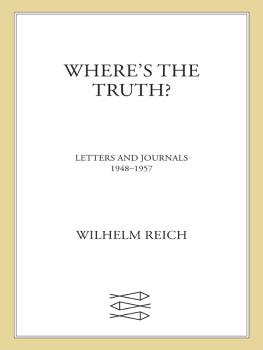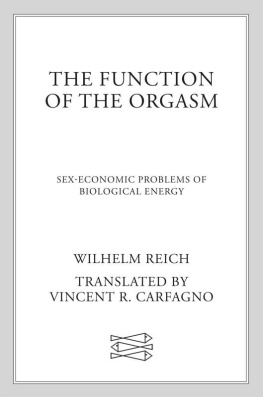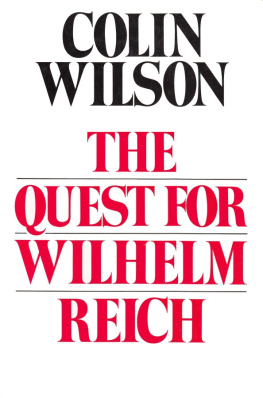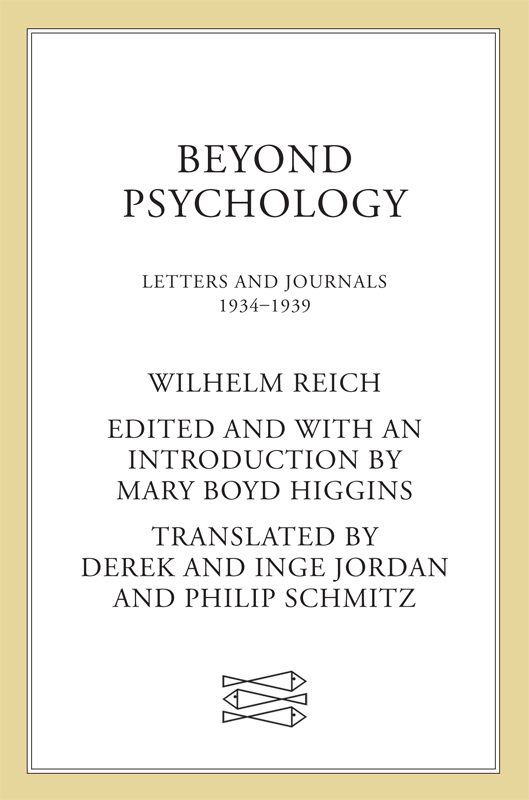
The author and publisher have provided this e-book to you for your personal use only. You may not make this e-book publicly available in any way. Copyright infringement is against the law. If you believe the copy of this e-book you are reading infringes on the authors copyright, please notify the publisher at: us.macmillanusa.com/piracy.
Contents
E DITORS N OTE
It is a great privilege to have access to the unpublished writings of Wilhelm Reich and to be in a position to compile and edit this autobiographical work which follows his life from August 1934, when his active participation in the international psychoanalytic movement was ended, to the beginning of his American experience in 1939. In this period Reich moved from the clinical setting into the laboratory and to new experimental realms in biology and physics.
There have been many difficulties in preparing the work, not the least being the enormous amount of material from which selections had to be made. Reich was a prolific writer. Throughout his adult life, he scrupulously recorded his observations, findings, and thoughts in diaries and workbooks, in personal and professional correspondence, as well as in published manuscripts. My task has been to choose from these diverse materials in a way that reveals within the confines of a limited number of pages the scope and diversity of Reichs story. I do not know if I have succeeded in this effort, but I have honestly tried. There have been many times when I felt overwhelmed. Reichs life was neither neat nor smooth, nor did it always conform to the social mores of his time. It was passionate and bold, full of controversy and conflict, always in motion, and, in its unwavering search for the simplest truths about life itself, extraordinarily complex.
Readers who are familiar with Reichs account of his early years, Passion of Youth, will undoubtedly note and question the time gap between its ending in 1922 and the beginning, in 1934, of Beyond Psychology. Let me explain. During the confusion that followed Reichs death, his archives were stolen. Although a legal action forced the return of most of this material, some documents are still missing, including all diaries from 1922 to 1934. Since attempts to retrieve them have so far failed, it was decided to proceed with the publication of these later writings and to bridge the gap with a summary of the missing years. In preparing this summary, I have drawn heavily upon an unpublished manuscript by Reich entitled History of Sexpol, from which he extracted two major works, The Function of the Orgasm and People in Trouble. These books are now the best source of information about that formative period in his life.
In conclusion, I would like to thank my editor, Roslyn Schloss, our translators, Philip Schmitz and Derek and Inge Jordan, and Reichs American publisher, Roger W. Straus, for their significant contributions to the creation of this book.
Mary Boyd Higgins
The Wilhelm Reich Infant Trust
Forest Hills, New York
September 1994
I NTRODUCTION
REICHS DEVELOPMENT, 19221934
When Wilhelm Reich graduated from the medical school of the University of Vienna in 1922, he had already practiced psychoanalysis for three years and been a member of the Vienna Psychoanalytic Society for two. Absorbed by the basic question What is life? and convinced of the central role of sexuality in it, he had been drawn to the work of Sigmund Freud by Freuds understanding of sexuality as a developmental process that begins at birth and by his hypothesis of the existence of a psychic-sexual energy, the libido theory. In addition, the technique of psychoanalysis provided the young physician with a practical tool. But there were many unsolved problems, many unanswered questions in psychoanalytic theory and therapy and in the relation of this new discipline to the world in which it was growing. During the years from 1922 to 1934, Reich would struggle to protect and extend Freuds original clinical formulations and, in so doing, come into conflict with Freud himself.
The neurosis was originally understood by Freud as the result of a conflict between instinctual sexual drives and a negating society that prohibits and suppresses them. Symptoms observed in patients were considered to be expressions of these instincts that, for some unknown reason, had broken through in a distorted form from an unconscious psychic level. Implicit in the instinctual drives was an energy function Freud called libido. Its reality had yet to be proved, although Freud conjectured that it might be of a chemical nature. On the basis of this formulation of the neurosis, Freud had developed a therapy he hoped would cure neuroses. Using the technique of free association, in which the patient was to say anything but do nothing, psychoanalysis sought to get the patient to remember the events and feelings that had been repressed, to make the unconscious impulses conscious so they would be available to the individuals control and could be rejected or sublimated in some socially acceptable activity. Just here, in the goal of psychoanalytic treatment, lay the seeds of the conflict between Reich and Freud, because the demand for rejection or sublimation implied a moral judgment that the biological instincts are bad and society is immutable.
Reich had come to psychoanalysis with a grounding in basic science. He had studied astronomy, electronics, the quantum theory, and the physical theories of Einstein, Heisenberg, and Bohr. While his psychoanalytic colleagues tended to focus on the content of their patients memories and its interpretation, Reich was absorbed by questions of energy, the economic, quantitative factor in the neurosis. He would search for the energy source of neurosis, its somatic core.
Little was known about the nature of mental illness. The individual neurotic symptom was viewed as a foreign body in an otherwise healthy organism. Freud had said that symptoms must disappear when the unconscious was made conscious, but success was limited, and he later acknowledged this, stating that they may disappear. But, Reich asked, what led from may to must? What else besides making the unconscious conscious was necessary to assure the disappearance of the symptom? These questions were not generally asked, but Reich struggled with them in his practice. He began to investigate fantasies accompanying masturbation and to pay close attention to the types of masturbation engaged in by his patients. He found that the form of the fantasized act offered an approach to unconscious conflicts and infantile experiences. In addition, he observed that some patients symptoms would disappear if they were able to have a satisfying sexual experience, whether through masturbation or intercourse. The symptoms would return after several days but again disappear with sexual gratification. Increasingly, Reich focused his attention on the genital function and its central mechanism, the orgasm. In November 1923, he reported on Genitality from the Viewpoint of Psychoanalytic Prognosis and Therapy, asserting that the genital disturbance was an important, perhaps the most important, symptom of neurosis. His proposition was received with hostility by psychoanalytic colleagues who claimed that many patients were genitally healthy. What then constituted genital health? Reich investigated it more closely. He had his patients give exact descriptions of their behavior and sensations during the sexual act and, in the case of men, discovered that even with erectile potency they experienced little or no pleasure. Nor was there any involuntary behavior or dimming of consciousness. The meaning of sexual potency was now at issue. The concept of sexual potency, Reich stated, has no meaning at all without the inclusion of the economic, experiential, and energy aspects. Erectile and ejaculatory potency are merely prerequisites for orgastic potency. Orgastic potency is the capacity for sexual surrender without any reservations, the capacity for complete discharge of all dammed-up sexual excitation through involuntary, pleasurable convulsions of the body. No neurotic is orgastically potent. The somatic core of the neurosis had to be dammed-up sexual energy that could only be adequately discharged in the orgasm. Hence the study of orgastic impotence became the central clinical problem of Reichs research and orgastic potency the goal of his therapeutic efforts. Becoming aware of the repressed sexuality must go together with the capacity for orgastic discharge. Reich had expanded Freuds concept of cure with the addition of the economic energy factor, and he began to use the term sex economy to describe it.






